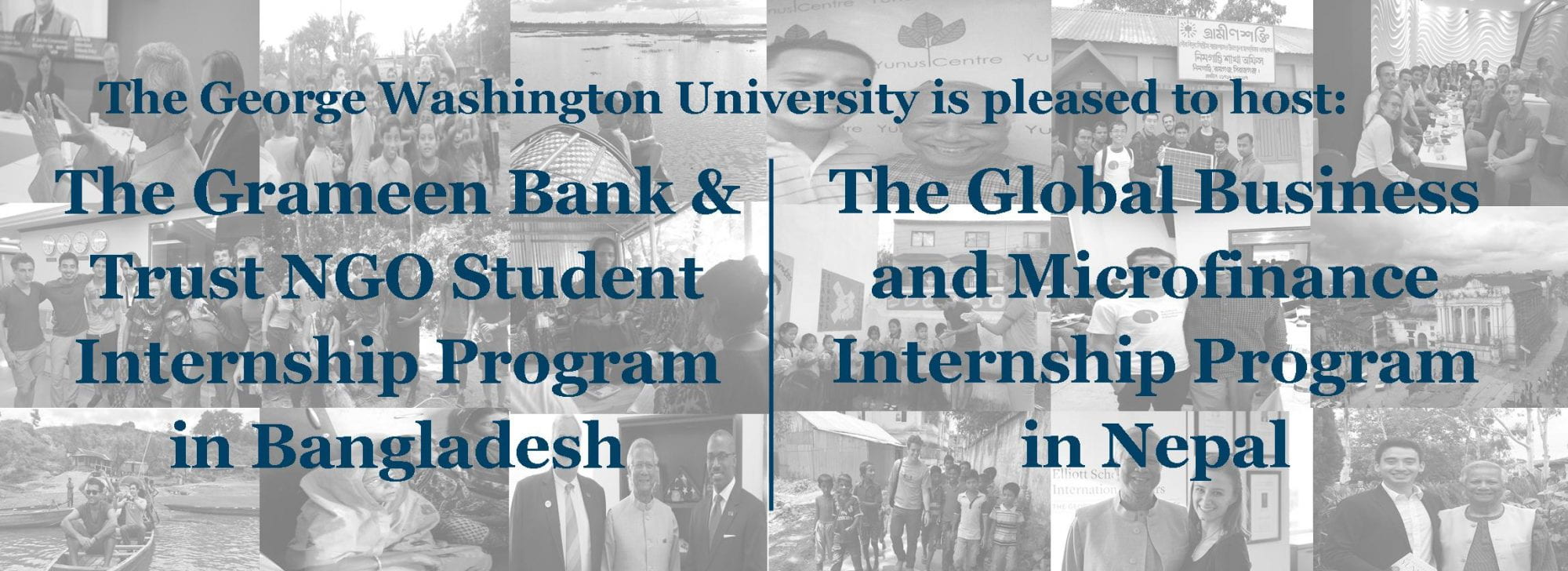About the Internship Program with the Yunus Centre at the Grameen Bank & Trust in Bangladesh
Yunus Centre’s Internship Programme aims to educate and involve bright young minds from all over the world in the field of Global Social Business to solve society's most pressing problems.
Student interns will be directly involved in the detailed reviewing of projects and grant proposals, case studies on social businesses, project monitoring and implementation of past/current or future international projects of Yunus Centre, and researching and writing reports on said projects. The student interns are expected to produce thorough summary reports which then can be used for decision-making by the management. They could be involved in events planning, session designs, content creation, and management among other tasks to be assigned to interns during events. Student interns would also be involved in producing posts and content for social media, creating media briefs on news related to social business and Professor Muhammad Yunus.
Please click here to down the flyer for this program.
About the Global Business and Microfinance Internship in Nepal
The Global Business and Microfinance Internship in Nepal, hosted by the George Washington University and in partnership with the Grameen Bank & Trust, is an excellent opportunity for undergraduate and graduate students to engage with top-tier institutions in the country. Participating students are able to intern with one of the following institutions in Nepal:
- Niti Foundation
- Kriti Capital & Investments Ltd.
- Biruwa
- Samriddhi Foundation
- Policy Entrepreneurs Inc.
Please click here to down the flyer for this program.
About the Grameen Bank & Trust
The Grameen Bank provides collateral-free loans to the poorest members of Bangladesh society with the goal of lifting individuals out of poverty. Founder of the Grameen Bank, Professor Muhammad Yunus, reasoned that if financial resources can be made available to the poor on terms and conditions that are appropriate and reasonable, it “can add up to create the biggest development wonder.” Professor Yunus was awarded the Nobel Peace Prize in 2006 for his critical efforts in the development of microfinance loans for the poor.
The Grameen Trust, a sister organization of the Grameen Bank, aims to replicate the Grameen Bank microfinance model in other impoverished areas of the world. The Grameen Trust organizes and operates global programs whose purpose is to:
- Support and promote poverty reduction
- Increase employment
- Increase management skills of the disadvantaged
- Improve health and sanitation services for the disadvantaged
The Grameen Trust also provides training to national and international organizations and supports the activities of the Grameen Bank.
About Professor Muhammad Yunus
Muhammad Yunus was born on June 28, 1940 in the village of Bathua, in Hathazari, Chittagong, the business centre of what was then Eastern Bengal. He was the third of 14 children, of whom five died in infancy. His father was a successful goldsmith who always encouraged his sons to seek higher education. But his biggest influence was his mother, Sufia Khatun, who always helped any poor person or relative who knocked on their door. This inspired him to commit himself to the eradication of poverty. His early childhood years were spent in the village. In 1947, his family moved to the city of Chittagong, where his father had a jewelry business.
In 1974, Professor Yunus, a Bangladeshi economist from Chittagong University, led his students on a field trip to a poor village. They interviewed a woman who made bamboo stools, and learnt that she had to borrow the equivalent of 15 pence to buy raw bamboo for each stool made. After repaying the middleman, sometimes at rates as high as 10% a week, she was left with a penny profit margin. Had she been able to borrow at more advantageous rates, she would have been able to amass an economic cushion and raise herself above subsistence level.
Realizing that there must be something terribly wrong with the economics he was teaching, Professor Yunus took matters into his own hands, and from his own pocket lent funds to 42 basket-weavers. He found that it was possible with a tiny amount not only to help them survive, but also to create the spark of personal initiative and enterprise necessary to pull themselves out of poverty.
Against the advice of banks and government, Professor Yunus carried on giving out ‘micro-loans,’ and in 1983 formed the Grameen Bank, meaning ‘village bank’ founded on principles of trust and solidarity. In Bangladesh by 2015, Grameen had 2,568 branches, with 21,751 staff serving 8.81 million borrowers in 81,392 villages. On any working day Grameen collects an average of $1.5 million in weekly installments. Of the borrowers, 97% are women and over 97% of the loans are paid back, a recovery rate higher than any other banking system. Grameen methods are applied in projects in 58 countries, including the US, Canada, France, the Netherlands and Norway.
For More Information:
Dr. Jane Ives
Director, Grameen Bank & Trust NGO Student Internship Program
jives@gwu.edu & 617-953-9430
Return to Home Page


